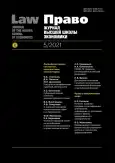Legal Regulation of Information Systems of Road Transport Telematics in Russia and Abroad
- Authors: Tereschenko L.1, Truntsevskiy Y.1, Leschenkov F.1
-
Affiliations:
- Institute of Legislation and Comparative Law under the Government of the Russian Federation
- Issue: Vol 14, No 5 (2021)
- Pages: 167-191
- Section: Russian Law: Condition, Perspectives, Commentaries
- URL: https://journal-vniispk.ru/2072-8166/article/view/318141
- DOI: https://doi.org/10.17323/2072-8166.2021.5.167.191
- ID: 318141
Cite item
Full Text
Abstract
About the authors
Ludmila Tereschenko
Institute of Legislation and Comparative Law under the Government of the Russian Federation
Email: Ltereschenko@hse.ru
ORCID iD: 0000-0002-2170-5339
Doctor of Science (Law), Associate Professor
Yuri Truntsevskiy
Institute of Legislation and Comparative Law under the Government of the Russian Federation
Email: trunzev@yandex.ru
ORCID iD: 0000-0002-9906-0585
Doctor of Science (Law), Professor
Felix Leschenkov
Institute of Legislation and Comparative Law under the Government of the Russian Federation
Email: noreply@hse.ru
ORCID iD: 0000-0003-2221-6710
Researcher
References
- Azzopardi M., Cortis D. (2013) Implementing Automotive Telematics for Insurance Covers of Fleets. Journal of technology management & innovation, vol. 8, no. 4, pp. 5967.
- Chuchaev A.I., Malikov S.V. (2019) Liability for damage caused by a highly automated vehicle: state and prospects. Actualnye problemy rossiyskogo prava = Current Issues of Russian Law, no. 6, pp. 117-124. (In Russ.).
- Guillen M., Nielsen J.P., Pérez-Marín A.M. & Elpidorou V. (2020) Can Automobile Insurance Telematics Predict the Risk of Near-Miss Events? North American Actuarial Journal, vol. 24, no. 1, pp. 141-152.
- Khabrieva T.Ya. (2018) Law and challenges of digital reality. Zhurnal rossijskogo prava = Journal of Russian Law, no. 9, pp. 5-16. (In Russ.).
- Khabrieva T.Ya., Chernogor N.N. (2018) Law in digital reality. Zhurnal rossiyskogo prava = Journal of Russian Law, no. 1, pp. 85-102. (In Russ.).
- Klopf J. (2018) Die Verkehrspsychologie im transdisziplinären Spannungsfeld von Technik und Umwelt. Vom Wagenlenker der Antike zum Autonomen Fahren — das neue Bewusstsein der Maschinen? Psychologie in Österreich. Themenschwerpunkt: Verkehrspsychologie, vol. 38, S. 7-18.
- Komarov V. V., Garagan S. A. (2012) Intelligent tasks of telematics transport systems and intelligent transport system. T-Comm: Telecommunicatsii i transport, 2012, vol. 6, no. 4, pp. 34-38. (In Russ.).
- Komarov V. V., Garagan S. A. (2016) Using the infrastructure of the Era-GLONASS system as the basis of telematics transport systems. Transport v Rossiskoi Federatsii = Transport in Russia, no. 1, pp. 22-25. (In Russ.).
- Pavlenko V. (2016) Improving processes of monitoring vehicles using telematics systems. Vestnik Khar'kovskogo natsionalnogo avtomobilno-dorozhnogo yniversiteta = Herald of Kharkov Car University, № 75. pp. 139-144.
- Pomerantz F. (2015) Auto insurance telematics data privacy and ownership. FORC Journal, vol. 26, pp. 1-16.
- Przybyl P., Vorobyova T. (2014) Complexity of transport telematics systems. Aktualnie voprosi innovatsionnoi economiki = Current Issues of Innovation Economics, no. 8-2, pp. 82-91. (In Russ.).
- Sharpe B., Schaller D. (2019) Telematics in The Canadian Trucking Industry. White Paper December 2019. International Council on Clean Transportation. 24 p. Available at: :https://theicct.org/sites/default/files/publications/Telematics_Canadian_trucking_industry_20191210.pdf
- Sitdikov I. M. (2012) Transport and telematics system as the basis for Informatization of the transport complex. Segodnya i zavtra rossiyskoy ekonomiki = Today and tomorrow of the Russian economy, no. 52, pp. 151-154. (In Russ.).
- Tikhomirov Yu. A. (2020) Law: the moment of rest or the anticipatory impact on social processes. Zhurnal rossiyskogo prava = Journal of Russian Law, no. 4, pp. 5-16. (In Russ.).
- Wahlström J., Skog I. and Händel P. (2017) Smartphone-Based Vehicle Telematics: A Ten-Year Anniversary. IEEE Transactions on Intelligent Transportation Systems, vol. 18, no. 10, pp. 2802-2825.
- Zubarev S. M. (2018) Implementation of the National technological initiative: on the correlation of the concepts “administrative barriers” and “legal barriers”. Administrativnoe pravo i protcess = Administrative Law and Process, no. 10, pp. 4-9. (In Russ.).
Supplementary files








